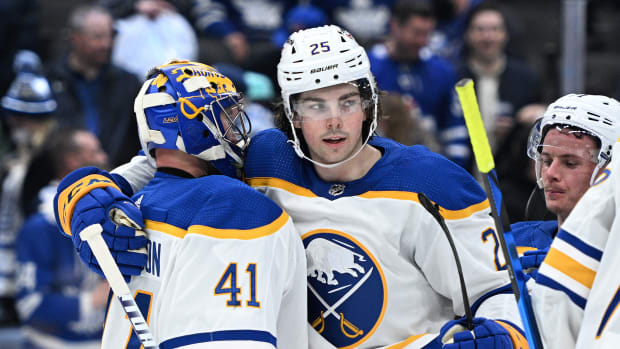You’re reading the latest file in THN.com’s NHL-team-by-team analysis of big questions before the start of the upcoming regular season. Today, we’re identifying Three Burning Questions for the Buffalo Sabres:
THREE BURNING QUESTIONS FOR THE SABRES IN 2022-23:
1. How fast will the Sabres’ talented young core develop? Buffalo’s years of dismal performance have given them a slew of exciting, up-and-coming young players. But the biggest question is how fast their elite-level skills will develop into the top tier of the world’s best hockey league. Twenty-two-year-old star defenseman Rasmus Sandin is entering his fifth NHL season, and although he set new personal bests in goals (13), assists (40) and points (53), there’s still a sense his game has more growth in it.
Meanwhile, rookie blueliner Owen Power – who played approximately 10 percent of Buffalo’s games last season, averaging 22:05 in ice time – could contend for the Calder Trophy as the league’s top first-year player. A big year from him will likely mean a significant improvement in the standings. And although the Sabres’ group of defensemen are on the young and inexperienced side – five of their top D-men are 24 or younger – the potential with this group is considerable.
Up front, Sabres head coach Don Granato is being paid in large part to get the most out of young forwards Dylan Cozens, Jack Quinn, Tage Thompson, Alex Tuch and Peyton Krebs. There are varying degrees of growth in their individual games, but Buffalo’s forwards may need another year before powering this franchise into the playoffs. It must be agonizing for Sabres fans to hear “one more year” and not want to grind their teeth into powder, but when you consider GM Kevyn Adams will probably sell off their entire fourth line of forwards – Zemgus Girgensons, Kyle Okposo, and Vinnie Hinostroza, all unrestricted free agents next summer – you can see where they just won’t have the horses to qualify for the championship derby.
2. Is Buffalo’s goaltending going to look better than last year? That’s the only thing that’s possible, right? By and large, Buffalo’s goaltending was a monstrosity last season. Their goals-allowed-per-game average of 3.50 was eighth-worst in the NHL. They employed six netminders during the year, and none of the three goalies who played the majority of the season had a Goals-Against Average below 3.12 or a Save Percentage better than .899. Veteran Craig Anderson was the best of the bunch, with a 17-12-2 record in 31 games, but he missed a bunch of games early in the season after an upper-body injury, and he’s now 41 years old, and naturally, a risk to be injured again.
The Sabres’ backup situation has changed, with journeyman Dustin Tokarski departing, and former Jets and Devils goalie Eric Comrie signed to a two-year, $3.6-million contract. The 27-year-old Comrie played well in Winnipeg last season, with a .920 SP and 2.58 G.A.A., but he appeared in only 19 games – exactly half of his entire NHL career appearances. It’s possible Anderson stays healthy and gives Buffalo 40-games-or-so this season, but some of us think it’s more likely the Sabres’ goaltenders don’t play well enough to make them a playoff team. We’re skeptical they’ll prove us wrong.
3. What’s management going to do with all that salary cap space? The Sabres have more than $19.6 million in cap space – second only to Arizona ($20.3 million) – and Adams has the wherewithal to help facilitate trades that assume bad contracts in return for prospects and draft picks. But will Buffalo ownership want to invest more money in a product that will be hard-pressed to carve out a playoff spot and the profits that come with hosting at least three playoff games?
Adams needs to be patient during the season before using up his cap space. In the current off-season, the asking price for taking on bad contracts was not particularly high. But once teams deal with the ramifications of in-season injuries, Adams will be able to command better hauls. In any case, while there’s no gigantic benefit of spending their cap space, the optics of keeping the payroll at its current number would not be ideal. Paying Thompson on a long-term contract (seven years, $50 million) is a good sign ownership is prepared to commit to Adams’ acquisitions. Now Sagres fans need to see more of it.



